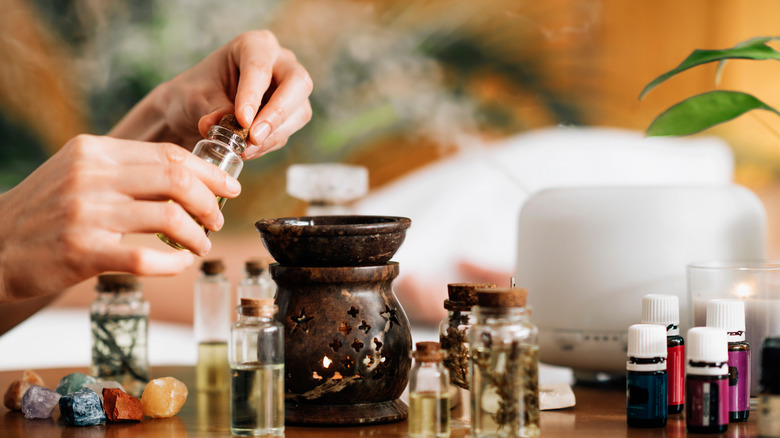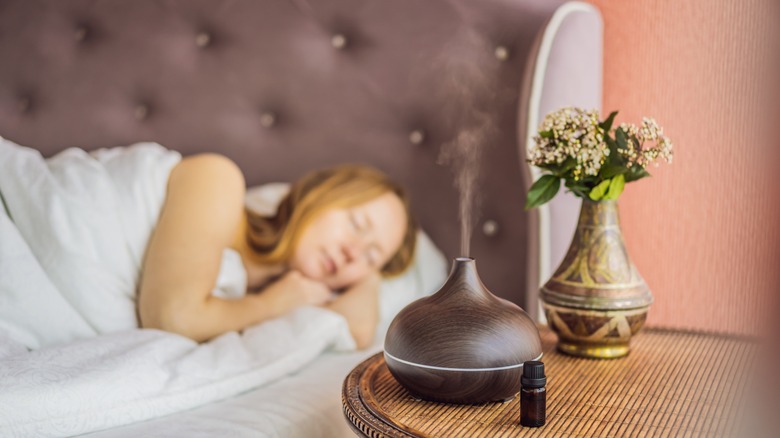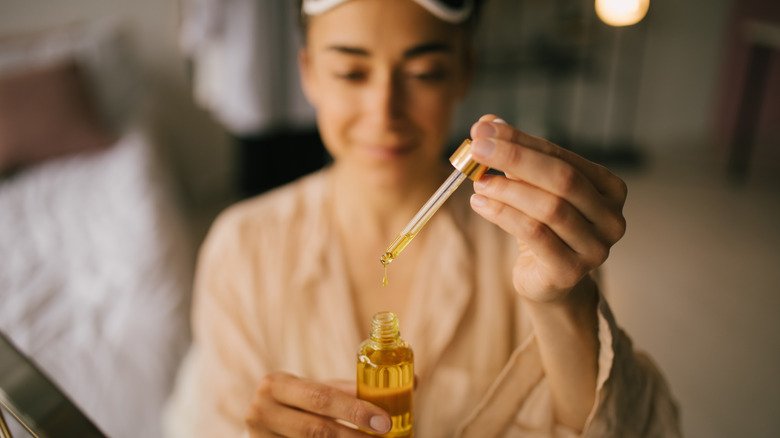The Essential Oil Combinations For A Tranquil Bedtime
If you have a hard time winding down before bed, you're not alone; factors including stress, Seasonal Affective Disorder, poor sleep hygiene, exposure to screens and blue light (via Healthline), or revenge bedtime procrastination (via Sleep Foundation), can all have an impact on your ability to go to sleep and stay there. You may not have insomnia, but find yourself struggling to put away the day's work and play, unsure how to turn your mind off before bed.
To trick your body into sleep mode, you might tackle the five senses. For sight, you can play around with lighting: red light therapy has been studied for its positive effect on melatonin production, aka the sleep hormone, as well as improved sleep quality, per Healthline. However, researchers are still studying which light wave colors are most conducive to healthy sleep patterns and relaxation. For sound, you might check out a sound machine — The Sleep Doctor recommends white noise or nature sounds to help you settle down.
For touch, the outlet recommends keeping the bedroom at a cool temperature and pulling out your softest clean pillowcases, fresh sheets, and cozy blankets. And for taste, Healthline has a list of before-bed food go-to's that can improve sleep quality, including almonds, which contain melatonin, and chamomile tea, which boasts a range of helpful antioxidants for getting sleepy.
But what should we smell before an easy night in? Essential oils might just make a difference in our sleep struggles.
Mix and match oils in your nightly routine
Loving Essential Oils sees combining scents as your best bet for a chill transition to sleep. If you aren't applying your essential oils topically (which requires some level of dilution, skin-friendly chemistry, and carrier oil) you'll only need your preferred essential oil diffuser, the specified amount of water, and your oils of choice at hand. For drop amounts, the outlet gauges a total of 5 to 10 drops as ideal for an electric diffuser, though this may vary based on room size, the strength of scent, and whether anyone involved has smell sensitivities.
The best essential oil combinations for relaxation can include cedarwood and rose or orange, tangerine and patchouli, and lavender and sandalwood, per the outlet. Various forms of lavender are still being studied for the plant's potential neurological benefits, but its therapeutic effects are regularly acknowledged, per the National Library of Medicine. This makes it an ideal scent to combine with other calming remedies — the outlet sees it as compatible with eucalyptus for encouraging deep breathing before bed, and lavender combined with vetiver is another strong contender for creating a meditative environment. But what is the right vehicle for your pre-bed scent treatment, and is one method more effective than the others?
Chose your own bedtime adventure
Like most parts of your nightly routine, your smell-based rituals are heavily informed by your personal preferences. If you have a fascination with fire, lavender-scented candles may be your bedtime go-to. But if you're ready to experiment with other forms of calming scent therapy, you can try a reed diffuser, which is a functional long-term choice. Per Loving Essential Oils, you'll use several reed sticks in a bottle-necked glass vessel, adding around 30 drops of your chosen essential oils to the glass along with a carrier oil, such as almond or jojoba oil, to subdue them. You'll flip the sticks on their heads every three or so days, according to Essential Oil Haven, so that the fragrance spreads around your desired area without over-saturating the sticks.
Electric essential oil diffusers are better for short-term, controlled scent intensity, per ABC10 News. Loving Essential Oils recommends diffusing for no longer than 30 to 60 minutes at a time since your body will acclimate to the smell after reaping the available benefits. By using your diffuser sporadically, the 5 to 10 drops of oils and the appropriate amount of water will last in your diffuser for a few days before needing replacement. More frequent oil changes will also allow you to play around with different scents more frequently than with reed diffusers.
Without a diffuser, you can check out bath blends, skin-friendly massage oils, and even inhaler options to get your fix of essential oil tranquility before bed.


